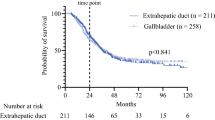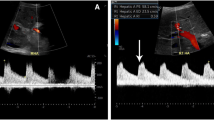Abstract
Purpose
Few studies have focused on conversion surgery for biliary malignancy; thus, it is not clear if this treatment modality can extend the survival of patients with unresectable biliary malignancy. We conducted a multicenter retrospective cohort study to evaluate the surgical outcomes of conversion surgery in this setting and analyze long-term survival.
Methods
We collected clinical data retrospectively on patients who underwent conversion surgery for biliary malignancy.
Results
Twenty-four patients met our inclusion criteria. Preoperative chemotherapy regimens or chemoradiation therapy regimens were administered based on the institutional criteria, and surgical procedures were chosen based on tumor location. Morbidity occurred in 16 patients (66.7%), and 1 patient died of liver failure after surgery. The overall 5-year survival rate following initial therapy was 43.2%, and the median survival time was 57.4 months. The corresponding values following surgery were 38.2% and 34.3 months, respectively. The 5-year survival rate of the 24 patients who received both chemotherapy and surgery was significantly better than that of 110 patients treated with chemotherapy only (p < 0.001).
Conclusion
Conversion surgery for initially unresectable biliary malignancies may be feasible and achieve long-term survival for selected patients.





Similar content being viewed by others
References
Valle J, Wasan H, Palmer DH, Cunningham D, Anthoney A, Maraveyas A, et al. Cisplatin plus gemcitabine versus gemcitabine for biliary tract cancer. N Engl J Med. 2010;362(14):1273–81.
Kato A, Shimizu H, Ohtsuka M, Yoshitomi H, Furukawa K, Takayashiki T, et al. Downsizing chemotherapy for initially unresectable locally advanced biliary tract cancer patients treated with gemcitabine plus cisplatin combination therapy followed by radical surgery. Ann Surg Oncol. 2015;22(Suppl 3):S1093–S10991099.
Bismuth H, Adam R, Levi F, Farabos C, Waechter F, Castaing D, et al. Resection of nonresectable liver metastases from colorectal cancer after neoadjuvant chemotherapy. Ann Surg 1996;224(4):509–20; discussion 20–2.
Adam R, Delvart V, Pascal G, Valeanu A, Castaing D, Azoulay D, et al. Rescue surgery for unresectable colorectal liver metastases downstaged by chemotherapy: a model to predict long-term survival. Ann Surg 2004;240(4):644–57 (discussion 57–8).
Satoi S, Yamaue H, Kato K, Takahashi S, Hirono S, Takeda S, et al. Role of adjuvant surgery for patients with initially unresectable pancreatic cancer with a long-term favorable response to non-surgical anti-cancer treatments: results of a project study for pancreatic surgery by the Japanese Society of Hepato-Biliary-Pancreatic Surgery. J Hepatobiliary Pancreat Sci. 2013;20(6):590–600.
Kato K, Kondo S, Hirano S, Tanaka E, Shichinohe T, Tsuchikawa T, et al. Adjuvant surgical therapy for patients with initially-unresectable pancreatic cancer with long-term favorable responses to chemotherapy. J Hepatobiliary Pancreat Sci. 2011;18(5):712–6.
Grendar J, Grendarova P, Sinha R, Dixon E. Neoadjuvant therapy for downstaging of locally advanced hilar cholangiocarcinoma: a systematic review. HPB (Oxford). 2014;16(4):297–303.
Wagner A, Wiedmann M, Tannapfel A, Mayr C, Kiesslich T, Wolkersdorfer GW, et al. Neoadjuvant down-sizing of hilar cholangiocarcinoma with photodynamic therapy–long-term outcome of a phase II Pilot study. Int J Mol Sci. 2015;16(11):26619–28.
Oshiro Y, Takahashi K, Sasaki R, Kondo T, Sakashita S, Ohkohchi N. Adjuvant surgery for advanced extrahepatic cholangiocarcinoma. World J Gastroenterol. 2013;19(40):6934–8.
Saito H, Noji T, Okamura K, Tsuchikawa T, Shichinohe T, Hirano S. A new prognostic scoring system using factors available preoperatively to predict survival after operative resection of perihilar cholangiocarcinoma. Surgery. 2016;159(3):842–51.
Clavien PA, Barkun J, de Oliveira ML, Vauthey JN, Dindo D, Schulick RD, et al. The Clavien–Dindo classification of surgical complications: five-year experience. Ann Surg. 2009;250(2):187–96.
Evans DB, Rich TA, Byrd DR, Cleary KR, Connelly JH, Levin B, et al. Preoperative chemoradiation and pancreaticoduodenectomy for adenocarcinoma of the pancreas. Arch Surg. 1992;127(11):1335–9.
Capussotti L, Muratore A. Neoadjuvant chemotherapy and resection of advanced synchronous liver metastases before treatment of the colorectal primary (Br J Surg) 2006; 93; 872–878. Br J Surg 2006;93(12):1564 (author reply).
Takamoto T, Hashimoto T, Sano K, Maruyama Y, Inoue K, Ogata S, et al. Recovery of liver function after the cessation of preoperative chemotherapy for colorectal liver metastasis. Ann Surg Oncol. 2010;17(10):2747–55.
Tomasello G, Petrelli F, Ghidini M, Russo A, Passalacqua R, Barni S. FOLFOXIRI plus bevacizumab as conversion therapy for patients with initially unresectable metastatic colorectal cancer: a systematic review and pooled analysis. JAMA Oncol. 2017;3(7):e170278.
Asano T, Hirano S, Nakamura T, Okamura K, Tsuchikawa T, Noji T, et al. Survival benefit of conversion surgery for patients with initially unresectable pancreatic cancer who responded favorably to nonsurgical treatment. J Hepatobiliary Pancreat Sci. 2018;25(7):342–50.
Zhang KJ, Dyson G, Gatz JL, Silverman ME, Tesfaye AA, Shields AF, et al. Outcomes in patients with metastatic pancreatic adenocarcinoma with the introduction of new chemotherapeutic drugs: 10-year experience of a single NCI-designated comprehensive cancer center. Am J Clin Oncol. 2018.
Noji T, Okamura K, Tanaka K, Nakanishi Y, Asano T, Nakamura T, et al. Surgical technique and results of intrapancreatic bile duct resection for hilar malignancy (with video). HPB (Oxford). 2018;20(12):1145–9.
Nagino M. Perihilar cholangiocarcinoma: a surgeon's viewpoint on current topics. J Gastroenterol. 2012;47(11):1165–76.
Higuchi R, Ota T, Araida T, Kajiyama H, Yazawa T, Furukawa T, et al. Surgical approaches to advanced gallbladder cancer : a 40-year single-institution study of prognostic factors and resectability. Ann Surg Oncol. 2014;21(13):4308–16.
Higuchi R, Yazawa T, Uemura S, Izumo W, Furukawa T, Yamamoto M. High-grade dysplasia/carcinoma in situ of the bile duct margin in patients with surgically resected node-negative perihilar cholangiocarcinoma is associated with poor survival: a retrospective study. J Hepatobiliary Pancreat Sci. 2017;24(8):456–65.
Sugiura T, Okamura Y, Ito T, Yamamoto Y, Ashida R, Ohgi K, et al. Left hepatectomy with combined resection and reconstruction of right hepatic artery for bismuth type I and II perihilar cholangiocarcinoma. World J Surg. 2019;43(3):894–901.
Nagino M, Nimura Y, Nishio H, Ebata T, Igami T, Matsushita M, et al. Hepatectomy with simultaneous resection of the portal vein and hepatic artery for advanced perihilar cholangiocarcinoma: an audit of 50 consecutive cases. Ann Surg. 2010;252(1):115–23.
Matsuyama R, Morioka D, Mori R, Yabushita Y, Hiratani S, Ota Y, et al. Our rationale of initiating neoadjuvant chemotherapy for hilar cholangiocarcinoma: a proposal of criteria for "borderline resectable" in the field of surgery for hilar cholangiocarcinoma. World J Surg. 2018.
Nakanishi Y, Tsuchikawa T, Okamura K, Nakamura T, Tamoto E, Murakami S, et al. Prognostic impact of the site of portal vein invasion in patients with surgically resected perihilar cholangiocarcinoma. Surgery. 2016;159(6):1511–9.
Noji T, Tsuchikawa T, Okamura K, Tanaka K, Nakanishi Y, Asano T, et al. Concomitant hepatic artery resection for advanced perihilar cholangiocarcinoma: a case-control study with propensity score matching. J Hepatobiliary Pancreat Sci. 2016;23(7):442–8.
Kishi Y, Zorzi D, Contreras CM, Maru DM, Kopetz S, Ribero D, et al. Extended preoperative chemotherapy does not improve pathologic response and increases postoperative liver insufficiency after hepatic resection for colorectal liver metastases. Ann Surg Oncol. 2010;17(11):2870–6.
Acknowledgements
We thank all members of the HOCS study team and the members of the Departments of Surgery of Hokkaido University, Sapporo Medical University, and Asahikawa Medical University.
Funding
Authors’ own resources.
Author information
Authors and Affiliations
Contributions
TN wrote the manuscript. TN, MN, KI, MI, KO, MK, and YK collected data. YK and SH were responsible for the study design and manuscript revision.
Corresponding author
Ethics declarations
Conflict of interest
We have no conflicts of interest to declare.
Ethical approval
All procedures performed in studies involving human participants were carried out in accordance with the ethical standards of the institutional and/or national research committee and with the 1964 Helsinki declaration and its later amendments or comparable ethical standards. The ethics committees of Hokkaido University Hospital, Sapporo Medical University Hospital, and Asahikawa Medical University approved the study. Based on the national Japanese law and guidelines for clinical research, informed consent was not needed from participants included in the study. This study registration number is UMIN000035900.
Additional information
Publisher's Note
Springer Nature remains neutral with regard to jurisdictional claims in published maps and institutional affiliations.
Electronic supplementary material
Below is the link to the electronic supplementary material.
595_2020_2031_MOESM2_ESM.tif
Supplementary file2 Supplemental Figure: Overall survival after surgery based on the preoperative carcinoembryonic antigen (CEA) level. There were significant differences in overall survival based on the CEA level (p < 0.001). CEA, carcinoembryonic antigen (TIF 298 kb)
Rights and permissions
About this article
Cite this article
Noji, T., Nagayama, M., Imai, K. et al. Conversion surgery for initially unresectable biliary malignancies: a multicenter retrospective cohort study. Surg Today 50, 1409–1417 (2020). https://doi.org/10.1007/s00595-020-02031-5
Received:
Accepted:
Published:
Issue Date:
DOI: https://doi.org/10.1007/s00595-020-02031-5




